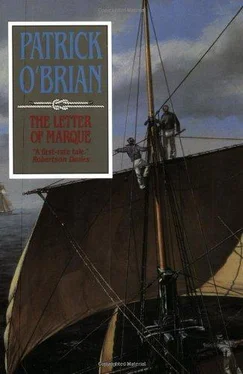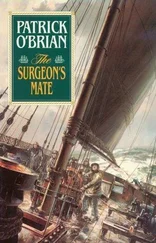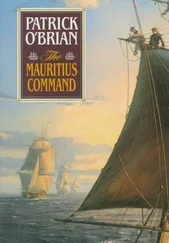Patrick O'Brian - The Letter of Marque
Здесь есть возможность читать онлайн «Patrick O'Brian - The Letter of Marque» весь текст электронной книги совершенно бесплатно (целиком полную версию без сокращений). В некоторых случаях можно слушать аудио, скачать через торрент в формате fb2 и присутствует краткое содержание. Жанр: Книги. Описание произведения, (предисловие) а так же отзывы посетителей доступны на портале библиотеки ЛибКат.
- Название:The Letter of Marque
- Автор:
- Жанр:
- Год:неизвестен
- ISBN:нет данных
- Рейтинг книги:3 / 5. Голосов: 1
-
Избранное:Добавить в избранное
- Отзывы:
-
Ваша оценка:
- 60
- 1
- 2
- 3
- 4
- 5
The Letter of Marque: краткое содержание, описание и аннотация
Предлагаем к чтению аннотацию, описание, краткое содержание или предисловие (зависит от того, что написал сам автор книги «The Letter of Marque»). Если вы не нашли необходимую информацию о книге — напишите в комментариях, мы постараемся отыскать её.
The Letter of Marque — читать онлайн бесплатно полную книгу (весь текст) целиком
Ниже представлен текст книги, разбитый по страницам. Система сохранения места последней прочитанной страницы, позволяет с удобством читать онлайн бесплатно книгу «The Letter of Marque», без необходимости каждый раз заново искать на чём Вы остановились. Поставьте закладку, и сможете в любой момент перейти на страницу, на которой закончили чтение.
Интервал:
Закладка:
What had he to offer in exchange for even a very little part of it, for the appearance of even a very little part of it? Money, of course; but of course in this context money was neither here nor there. If kissing did not go by favour it was not kissing at all. What else had he to offer? He might have ten thousand a year and a deer-park, at least a potential deer-park, but by no stretch of the imagination could he be called a handsome husband. Nor even a tolerable husband. He had little conversation and no charm. He had offended her very publicly and very deeply: or so she and her friends believed, which came to the same thing.
The more he reflected on it, lying there in the heave of the sea as the Leopard carried him towards Sweden, the more it seemed to him that his premonition was well founded, that his journey could not be anything but an exquisitely painful failure. At the same time he found the unreasoning part of his mind so longing for its success that he became physically distressed, seized with a kind of rigour that made him gasp. Presently he sat up, clasping his hands and rocking to and fro; and in time, against all good sense, all resolution and fortitude, he opened his chest, groped for the bottle, and repeated his night-draught.
He woke not so much from a laudanum sleep, for by now his tincture would have had little effect on a well-grown child, as from an unusual degree of mental exhaustion; yet in spite of that he was still so stupid that he might have been stuffed with poppy, mandrake and nepenthe, and it took him some moments to understand the steward's cry 'Come on, sir. We'm sunk.'
The man repeated his words, shaking the cot's hangings as he did so, and Stephen recognized the steady grinding thump below: the ship was aground, beating not on rock but on sand. 'Sunk?' he said, sitting up.
'Well, no, sir,' said the steward. 'That was just my jovial way of putting it, to rouse you, like; but that wicked little old bugger has run us on to the tail of the Grab, and Mr Roke is going ashore for help. Captain thinks the passengers should run in with him, in case the ship goes to pieces.'
'Thankee, steward,' said Stephen, getting up, tying his neck-cloth (which was all he had taken off) and locking his chest. 'Pray give a seaman this' - handing him a crown-piece - 'to see my dunnage into the boat; and if you could bring me a cup of coffee on deck you would oblige me.'
On the deck itself he found a thin grey daylight - drizzle, but no wind, and the ship beating less as she settled with the falling tide. The bosun had the pilot wedged against the rail and between insults the captain hit him with a rope's end. The other members of the crew were methodically getting a boat over the side, taking little notice of the pilot's cries. No land was in sight, nothing but yellowish-grey drizzle over yellowish-grey sea, but the people seemed confident of their whereabouts and there was no feeling of particular emergency.
Yet once over the side and manned the boat proved leaky, and they had not shoved off five minutes before water was washing about their feet. 'Jog the loo,' cried Mr Roke, addressing Stephen. And then louder, 'Jog the loo, I say.'
A friendly young mate, unseen before this moment, leant over Stephen and briskly worked the pump-handle up and down. They would be in Manton before the turn of the tide, he said, and if Stephen wished to put up at a comfortable inn, he could recommend the Feathers, kept by his auntie. It would not be a long stay, in all likelihood. They had just beat off the rudder and lost some of the false keel, but Joe Harris of Manton would tow them in and put them to rights as soon as she floated. The passengers were only put ashore because of the insurance. Stephen need not be afraid.
'Jog the loo,' cried Mr Roke.
'There's Manton, right ahead,' observed the young man, when Stephen had more or less cleared the boat. It was a promising East Anglian landscape, a flat, flat mingling of the elements, with decayed sea-walls, saltings, reed-beds in the half-light, and the smell of marsh-gas and seaweed mixed.
'Do you know the Reverend Mr Heath, of Manton?' asked Stephen.
'Parson Heath? Why, everyone knows Parson Heath. We always carry him anything rare, like a sea-baby or a king of the herrings.'
Mr Roke started up, balancing in the boat. 'Now, sir,' he said very loud, 'if you will not jog that bloody loo, change places with me, and I will jog it myself.'
In the front room on the first floor of the William's Head at Shelmerston Sophie read out 'Bread in bags, 21,226 pounds: the same in butts, 13,440 pounds. Flour for bread in barrels, 9000 pounds. Beer, in puncheons, 1,200 gallons. Spirits, 1,600 gallons. Beef, 4000 pieces. Flour in lieu of beef in half-barrels, 1,400 pounds. Suet, 800 pounds. Raisins, 2,500 pounds. Peas in butts, 187 bushels. Oatmeal, 10 bushels. Wheat, 120 bushels. Oil, 120 gallons. Sugar, 1,500 pounds. Vinegar, 500 gallons. Sauerkraut, 7860 pounds. Malt in hogsheads, 40 bushels. Salt, 20 bushels. Pork, 6000 pieces. Mustard seed, 160 pounds. Inspissated lime-juice, 10 kegs. Lemon rob, 15 kegs. The prices are on the list by the ink-well: I have worked out all the sums except the last two, which Dr Maturin has already paid; perhaps we could compare our answers.'
While Mr Standish, the Surprise's new and inexperienced purser, was multiplying and dividing, Sophie looked out of the window at the sunlit bay. The Surprise was lying against Boulter's wharf, taking in the vast quantities of stores recorded on the papers lying there on the table: the frigate was not looking her best, with her hatchways agape and derricks peering into her depths, while it would have been folly to lay on her last coat of paint before the lading was complete; but a seaman's eye would have observed the new suit of Manilla rigging, which any King's ship might have envied, to say nothing of the blaze of gold-leaf on her figurehead and the scrolls behind it. In the course of her long career she had been called L'Unite, the Retaliation and the Retribution, and the rather cross-looking image in front had answered, more or less, for any of these names; but now some natural genius had arched her eyebrows and pursed her mouth, so that she really was the personification of surprise - pleased surprise, with a great wealth of golden locks and an undeniable bosom.
As Sophie gazed she saw her children rush by below: saw and above all heard them. They could never at any time have been called genteel children, having been brought up mainly by strong-voiced, plain-speaking, over-fond seamen; but now that they had been let loose for some time among a whole community of adoring privateersmen, stuffed with sweetmeats and nips of sugared gin, loaded with knives, poll-parrots and shrunken heads from foreign parts, they were in a fair way to being ruined. At present Bonden and Killick were nominally in charge of them, but both were encumbered by Jack Aubrey's evening finery - the Aubreys were to dine with Admiral Russell - and they had been left far behind. In answer to their increasingly threatening cries the two girls stopped, poised on the low wall overlooking the hard; with admirable timing their little brother gave them each a shove, so that they fell a good four feet on to the shore. He pelted off for the ship as fast as his short legs could carry him and they were picked out of the low-tide shingle by three women of the town, dusted, comforted and mended in the kindest way - Charlotte's pinafore was torn. They were also told very firmly that they must not call out after their brother with such words as sod, swab and whoreson beast, because their mama would not like it.
Their mama did not like it, and she would have liked it even less if she had not known that they could switch from one kind of language to another without the slightest difficulty; yet even so she turned to Mrs Martin, who was darning her husband's stockings, and said 'My dear Mrs Martin, I shall be heartbroken when the ship sails, but if those children stay here much longer, I am afraid they will grow into perfect little savages.'
Читать дальшеИнтервал:
Закладка:
Похожие книги на «The Letter of Marque»
Представляем Вашему вниманию похожие книги на «The Letter of Marque» списком для выбора. Мы отобрали схожую по названию и смыслу литературу в надежде предоставить читателям больше вариантов отыскать новые, интересные, ещё непрочитанные произведения.
Обсуждение, отзывы о книге «The Letter of Marque» и просто собственные мнения читателей. Оставьте ваши комментарии, напишите, что Вы думаете о произведении, его смысле или главных героях. Укажите что конкретно понравилось, а что нет, и почему Вы так считаете.












